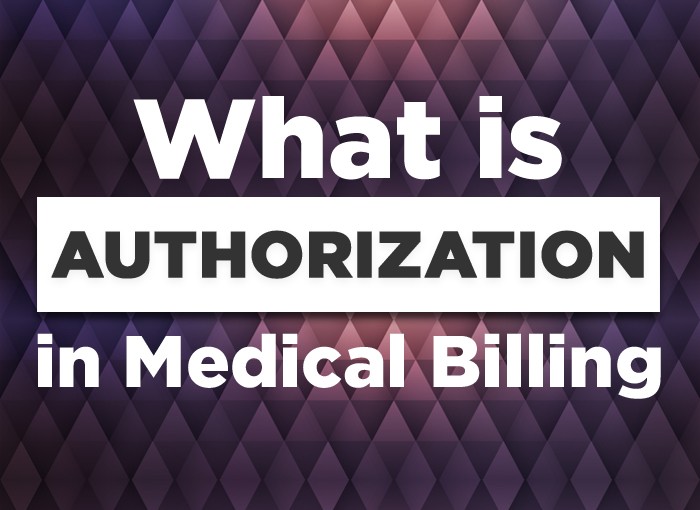What is Authorization in Medical Billing
Definition of Authorization
The term authorization refers to the process of getting a medical service(s) authorized from the insurance payer. The term authorization is also referred to as pre-authorization or prior authorization.
It is a legal obligation to ensure that the insurance payer pays for the specific medical service mentioned in the medical claim form. Without authorization, the insurance payer is free to refuse the payment of a patient’s medical service as part of the health care insurance plan.
The medical coder works with the health care provider to authorize the medical service. The medical service is then appropriate for entry into the database with the correct CPT code by the medical coder. However, he or she needs to be very cautious because an incorrect CPT code could result in denial by the insurer.
The responsibility for authorizing the medical procedure falls on the healthcare provider. The provider must apply for authorization before performing the procedure. Once approved, the payer provides the healthcare provider with an authorization number for any further references.

Why is Prior Authorization important for Healthcare Providers?
With pre-authorization, you can speed the billing process by reducing denial and follow-up. It would be best to check on prior authorization before proceeding with some treatments and procedures that may not be covered by their insurance company. With prior approval, practices are not just making it more likely for their claim to be paid but also making the billing process much easier.
The necessity for prior authorization should be verified in the pre-registration process. Once the patient’s eligibility is established, the insurance verification team must confirm whether prior authorization is required. If prior authorization is required, the potential CPT codes to be billed along with the ICD10 codes of the patient’s diagnosis must be submitted to the insurance company. Then, the company will decide whether it accepts the authorization for the bill to be submitted using the given procedure. With such permission, the procedure should be conducted with the patient.
By which, claim denials, delayed treatments, re-scheduled appointments, and much more are avoided. The staff at Capline Healthcare Management provide consultants in practice management that facilitate training and support by which consultancy, staffing, workflow, and configuration help have been provided.
Authorization Request Submission Process
The health care provider may submit authorization requests both manually and electronically. Offline and online forms are available to submit a written authorization request. Meanwhile, fax and mail are used to submit electronic authorization requests.
The requirements for authorization requests vary across insurance companies. However, the following information tends to remain similar while submitting authorization requests.
Patient’s Demographic information (name, date of birth, insurance ID number, etc.) during the insurance verification process
Information of the Provider (both referring and servicing provider)
1. Address
2. Tax ID Number
3. National Provider Identifier (NPI) number
4. Phone and fax number
The location where the service will be performed
1. Address
2. Tax ID Number
3. NPI number
4. Phone and fax number
- Requested procedure/ medical service along with correct CPT/HCPCS codes
- Diagnosis (corresponding ICD code and description)
- Length of hospital stay requested in case of inpatient requests
In addition to the above, the payer may ask for additional documents as per their requirement.
Preventing Denials Related to Authorization
Pre-authorization is a vital step in insurance verification, but it does not guarantee reimbursement. Here are a few tips to prevent claims denial due to authorization.
- Early Submission of Authorization Request: It is important to submit authorization requests before treatment. Early submission helps in obtaining the authorization number to determine the payment.
- Mention Authorization Number: While processing the claims, make sure to include the authorization number to prevent rejection of claims. This establishes that you have received prior authorization.
- Double Check Codes: To avoid claims rejections, double-check CPT/HCPCS codes for the mentioned treatment.
- Check Explanation of Denials: If the claims are rejected for an unexplained reason and there is no error from your side, then you must contact the payer.
The above tips are quite important to prevent authorization-related denials, but outsourcing insurance verification services can guarantee early authorization of medical services without any failure.
Challenges in Pre-Authorization
Getting approval before medical treatment can be difficult for several reasons. The American Medical Association (AMA) thinks it’s used too much. They worry about the extra costs, delays in care, and problems it causes for patients. But there are other concerns too.
Medical billing teams have a hard time figuring out all the codes, diagnoses, and other details about treatments and procedures. There can be other issues as well. Here are some challenges doctors and clinics might face when trying to get approval for medical billing.
It’s still important to ask the health insurance company for approval once the treatment plan is clear. Both the clinic and the patient need to know if the approval will be granted. If approval isn’t possible, another treatment plan will need to be chosen.
What Happens If Pre-Authorization Isn’t Done?
If medical billing doesn’t get pre-authorization from the insurance company, the claim might be delayed, denied, or only partly approved with lower payment rates. Often, the medical organization may have to pay some or all of the cost themselves. They might also try to resubmit the claim with reasons for appealing the decision, but this doesn’t guarantee the claim will be paid.
While it’s hard to predict every result of a denied claim, there are steps to reduce denials and avoid them. Here are some good ways to handle the pre-authorization process:
By using these good practices, many technical and human mistakes that could delay or deny claims can be avoided. With help from Capline Healthcare Management’s revenue cycle consulting, organizations can save money, deal with staff shortages, prepare for growth, and improve patient care.



